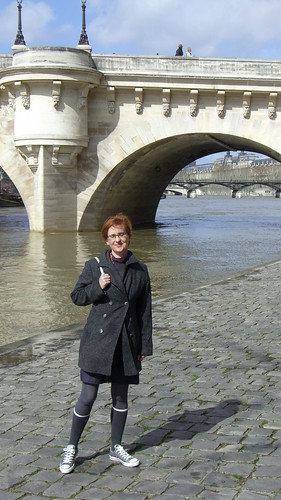If you don't like pretension, look away now.
Over the past couple of years it seems I have become a bit of francophile. I know this puts me in a difficult position. The Rainbow Warrior, diplomatic slipperiness, Mr
and Mrs Sarkozy. And that's before we look much of the recent movie output.
Since about 2006 I've been learning the language, slowly and perhaps quite badly. So I'm not quite ready to tackle Proust, but if I suddenly found myself lost on the Rue de Rivoli I could probably survive by ordering take-away coffee and turning left at the bank.
Learning the language was a response to a planned t
rip that I took with my family (less one) last year. I had spent about a fortnight in France in 1989 without so much as a
bonjour to bless myself with.
At that time, I didn't 'get' France and I didn't enjoy it. The main reason was that I felt so hugely disadvantaged the entire time. Nothing was any fun. I mostly remember splitting headaches, possibly from the coffee, and walking for miles around Paris without ever seeing much. I know, I know...
So having been to France and satisfied my earlier frustration, why do I remain fascinated by the place? It is partly the exotic qualities. Melbourne is a great place to live but you couldn't call it one of the world's great romantic places. Lots of adjectives but not that one.
It is partly the myth of France that attracts me. I am fascinated by the contradiction between the old world and its modern manifestations. A country that is both progressive and deeply conservative. Paris pretty much invented the
avant garde. Entwined in its history is a deep concern for the rights of man and yet the present is riven by racism. France is the seedbed of existentialism (and many other isms) and the place of so many grand cathedrals. And so on and so on.
When I went to university, cultural studies and semiotics were all the go. Out with the Anglo-American school, in with the French: Saussure, Roland Barthes, and hot on his heels, Foucault and then the feminists. I didn't get too far with all of this. Reading Sausurre and Barthes was a lot like going to France and not speaking the language. You could observe, and it could be vaguely enjoyable, but for the most part one had not a bloody clue what was going on.
I have been thinking about Barthes lately because I have been reading a book on French and Belgian comics, which takes an old school semiotic approach French and Belgian comics. It's a closely argued 200-odd pages on how meaning is made in
la bande dessinee. It was a pleasure to revisit this kind of writing and thinking, this analytical approach to a subject. It was like revisiting a younger self.
Now, I feel like I get it. I get that the task the theorist undertakes is to tease out meaning, not to pronounce it. I get on board and enjoy the game, see how the writer investigates the relational nature of meaning. And in a funny way, I don't read it with the same earnest approach that I might have 25 years ago. I enjoy the pursuit.
I think those early university encounters, even in their frustrations, set me up for a longer interest in France. I should repeat that I didn't ever make great headway in matters theoretical. I lacked the truly obsessive character needed to fully get ahead in that. But I tried. It was like I didn't really understand what theory was for.

Roland Barthes was like a sideways entrance into French culture of the period he was writing about. Perhaps what Barthes did was point me towards a world that I didn't understand. But I did enjoy the view of the world that certain French writers and thinkers provided. Whether it was the dandyism and style of Jean Cocteau's films, the wryness of Louis Malle or
Philippe Noiret, or a dozen other films, there is something revealing and serious about this stuff.
I also enjoyed, if that is the right word, the books of Simone de Beauvoir. All her four books of her autobiography;
The Second Sex,
The Blood of Others,
She Came to Stay,
The Mandarins. Especially that one. By the time I read it, I knew enough about de Beauvoir to piece together some of the facts and the fictions. Perhaps I dreamed of going to another country and starting a new life with another lover, as the character does in
The Mandarins. Maybe, can't remember.
I have just finished reading to my daughter a French novel (translated, of course),
Toby Alone by Timothee de Fombelle. The book has a little motif towards the end that reminds Toby that his life really only has one true thread and he can turn his back on it but it will always be there. That there is no running away, just as it was for de Beauvoir.
While we were in Paris, we made a point of going to Montparnasse Cemetery to see Simone de Beauvior's grave. It is a simple, quite plain headstone, near the limestone wall. I confess that I was just a little bit cross that she is sharing eternity with Sartre, who, I'm afraid, I see as very much her inferior. Their lives were far more complicated than the ending implies, but as another poet said, such is life. It was, I think, de Beauvoir who really got me hooked on French culture. In her autobiographies she is both a close-hand observer and a critic. An insider and outsider. Think of the reception that she received on the publication of the Second Sex! C'est scandaleux! Her books so fascinated, informed, confounded and yes, inspired me, that 25 years later I am still looking for answers.
I encountered Simone de Beauvoir's books at a time that it was absolutely crucial for me. They provided escape, challenge and insight at a time when I needed certain things to be explained. In writing about her past, she provided me with the sense of a future.



































